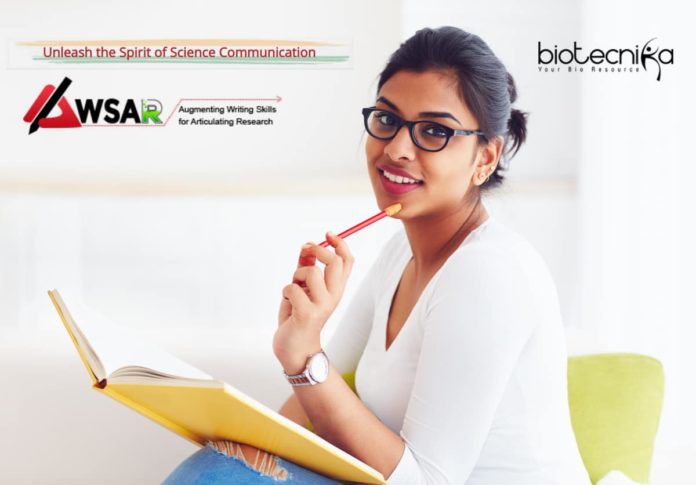DST AWSAR Program – Share Your Research Story & Win Cash Prize
The call for entries for the DST AWSAR Program has been announced. AWSAR was a big success last year and the call for this year has been released. Indian nationals pursuing any stream of Science & Technology (S&T) are encouraged to apply for the DST AWSAR Program as per details below:
This call expires in :
“Augmenting Writing Skills for Articulating Research (AWSAR)” is an initiative of Department of Science and Technology (DST ), Government of India. It attempts to disseminate Indian research stories of Science, Technology & Innovation being pursued In the nation in a format that’s simple to comprehend and interesting for all of the stakeholders.
DST invites lucid stories from PhD scholars and Post Doctoral Fellows (PDF) with a goal to strengthen the ecosystem of science communication and inculcate scientific character in society.
Indian citizen pursuing PhD or PDF in almost any stream of Science and Technology (S&T), within the tenancy period of her/his
research, can submit the entry. The narrative needs to link to research being pursued by him/her.What’s AWSAR?
Augmenting Writing Skills for Articulating Research (AWSAR) is a brand new initiative commissioned by Department of Science and Technology (DST) and coordinated by Vigyan Prasar (An autonomous institute of DST) to link current gap in communication research to common person by using the latent potential of PhD Scholars and Post-Doctoral Fellows (PDFs). These are the goals of the initiative
- Encourage youth pursuing higher studies to submit a minimum of one story/article according to their research work.
- Foster, fortify and create scientific temper through popular science writing and producing a culture of science communication/popularisation among the scholars.
- Recognize the initiative and also the output of researchers on the particular elements of physical, natural, mathematical and information sciences, applied science, engineering, technology, and multi-disciplinary science.
- Conduct training Workshops for Early Career Researchers (PhD Scholars and PDFs) in popular science writing.
Submission of popular science stories associated with research work of PhD scholars and PDFs:
Entries would be encouraged by research scholars and PDFs who would like to publish their research in a way that could appeal to non-scientific audiences. The story should revolve around the answering the questions like Why does my research matter?; Why is it significant? ; Why does it interest, researchers? ; Why should it interest the reader? ; objectively. The article has to be based on the research undertaken by the individual researcher. The article could be on complete or part of the research conducted, but it ought not to be a general review of the region and has to have the part of new knowledge generated as part of this research.
The article must target a general audience via popular writing and ought not to be published elsewhere. It needs to be written in simple to comprehend terminology to communicate the importance of the search for its outreach.
Qualification criteria for article submission:
These are the eligibility criteria for submitting the article for the award.
- The entries will be encouraged from the youth pursuing PhD in S&T and Post Doc fellows by a recognized University/R&D Institute.
- Applicants have to be an Indian citizen.
- Applicants can only submit an individual article in annually. Re-application by applicants in the prior years is invited, provided that the eligibility criteria continue to be met. But the previous winners of this award won’t be eligible to submit a research story second time in precisely the exact same category.
Selection Criteria:
The following are the criteria for judging the entries
- The entries will be judged on the basis of accuracy, clarity, insightfulness, fairness, and resourcefulness.
- The entries should convincingly answer the questions like Why does the research matter? Does the article clarify the author’s research in a means that’s simple to understand? Is it a compelling read? etc..
- An Expert Panel of science communicators, media people, subject specialists and professionals, featured by DST, will assess the science stories that are submitted.
Award categories:
- Selection of best 100 entries of science awards and stories.
a. For PhD researchers: The initial screening of this entry is going to be selected by an expert panel. 100 entries will be chosen and each will be given with cash prize of 10,000/along with Certificate of Appreciation.
b. For Postdoc fellows: Twenty entrances are chosen from articles submitted by PDFs relating to their own line of research. Each will be given with cash prize of 10,000/along with Certificate of Appreciation. - Selection of the top three major stories
a. For PhD researchers: The best three articles/stories will be chosen from the leading 100 stories. Further, they’ll be awarded the cash prize of 1,00,000/, Rs.50,000/- and 25,000/- respectively.
b. For Postdoc fellows: One outstanding article/story will be chosen from the leading 25 stories. Further the exact same will be awarded the cash prize of 1,00,000/.
These awards will be bestowed on 28 February in the National Science Day event each year. Each of the awardees will be provided with a chance to attend the Science Film Training Workshop arranged by Vigyan Prasar.
Workshops for early career researchers in writing popular science story:
The workshops plan to suggest tips for successful communication and remarkable writing in popular science writing format. An identified group of specialists will arrange a few workshops each year. The tentative theme will cover
- Discover what makes writing good.
- Emphasise an effective method of writing in the clearest way possible, use of jargon that describes its significance clearly.
- Utilization of proper words, language, sentences clinches for certain effects
- Strategies for original writing
- Strategies for obtaining a hook to catch the eye of the reader.
- Basic rules of style, the flow of words and phrases, Grammar and punctuation.
Fundamental guidelines for submitting a popular science story:
AWSAR programme will have the following guidelines for the execution:
- Any Indian citizen pursuing PhD or PDF in almost any S&T stream is qualified to apply under AWSAR.
- The scholars ought to be registered in a PhD program from Government approved Institutions for two years. PDF related to any recognized institute may also apply.
- Preference will be given to applicants with the published paper(s) of the research work. Both full-time and part-time PhD students will be encouraged for bigger involvement.
- The article should signify a complete research story in easy language to be understood by the general public. No intricate figures, graphs, equations or formulae must be included except self-explanatory infographics that might be formulated for successful communication.
- Only original articles sent only for nomination for AWSAR award will be approved. Articles previously published elsewhere, or concurrently sent for publication elsewhere, aren’t acceptable.
- The candidates are asked to mention the theme, title of the paper together with their name, affiliation, and contact information in the submitted article.
- Articles submitted must carry a statement that the article is original and hasn’t been previously published elsewhere.
- Article of 1000-1500 words (A4-size with 2.5 cm margin on all sides, single column, Times New Roman font, font size 12, 1.5 line spacing composed in MS Word)will be approved for further scrutiny.
- Applicants found guilty of plagiarism will be blacklisted and debarred from participating in the future.
- All articles must be submitted through an online portal. It’s suggested that hard copy may also be submitted to the office for record.
- A panel of distinguished scientists and science communicators featured by DST will pick the very best 100 entries received from PhD scholars and 20 best entries received from postdoctoral fellows.
- The award will cover the following two broad categories
- The top three entries/write-ups by the PhD scholars would be awarded the cash prizes of 1,00,000, 50,000 and 25,000, respectively. Also, 100 selected entries/write-ups, by the PhD scholars, would be awarded the cash prizes of ₹10,000 each, every year. The award will include a cash prize, a certificate of appreciation and an opportunity for the winning articles to be published.
- One outstanding story, by the post-doctoral fellows, will be given a cash prize of 1,00,000. Also, 20 selected entries/write-ups submitted by the post-doctoral fellows will be given a cash prize of 10,000 each and a certificate of appreciation.
Entries may be submitted from 15 August 2019 until 30 September 2019
For more information regarding the programme, please see www.awsar-dst.in
Important Links:
APPLY ONLINE
Editor’s Note: DST AWSAR Program, AWSAR Scheme, AWSAR DST, DST India AWSAR, Augmenting Writing Skills for Articulating Research (AWSAR), DST AWSAR Program 2019. Check out Podcast and also make sure you are subscribed to the Biotecnika Times Newsletter. And follow us on all of our social media platforms.









































